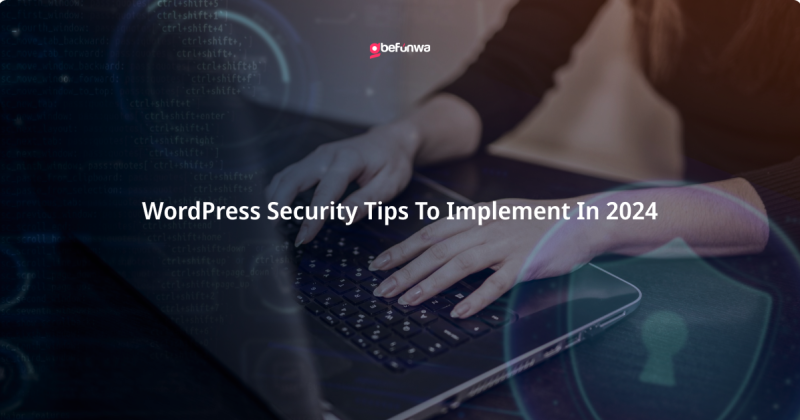
Your website may play a pivotal role in businesses’ success, but it is also a prime target for cyber threats. A hacked WordPress site can wreak havoc on your business’s reputation and finances. Hackers can steal user information, compromise passwords, install malicious software, and even distribute malware to your unsuspecting users. To make matters worse, you might find yourself forking over a ransom to regain control of your website. It’s a grim scenario, but fear not! We’ve compiled a comprehensive guide to help you bolster your website’s security in 2024 and shield it from cyber threats.
Staying up-to-date is paramount when it comes to WordPress security. The WordPress development community actively patches vulnerabilities and releases updates to address them. By regularly updating your WordPress core, themes, and plugins, you ensure that you’re equipped with the latest security enhancements. Hackers often exploit known vulnerabilities in outdated versions, making it essential to keep everything current.
While it might seem obvious, using strong, unique passwords is one of the simplest yet most effective ways to fortify your website’s defenses. Avoid easily guessable passwords, such as “password123,” and opt for complex combinations of letters, numbers, and special characters. Additionally, consider implementing multi-factor authentication (MFA) for added protection. MFA requires users to provide two or more forms of identification before gaining access to the website, adding an extra layer of security.
Your choice of hosting service can significantly impact your website’s security. At Gbefunwa, we continuously monitor their network for suspicious activity, have robust tools in place to thwart large-scale DDoS attacks, and diligently keep their server software, PHP versions, and hardware up to date. This proactive approach prevents hackers from exploiting known security vulnerabilities in outdated versions. Additionally, Gbefunwa provides disaster recovery and contingency plans in place to safeguard your data in the event of a major accident or unforeseen disaster.
Preparation is key to mitigating the impact of a security breach. Installing a reliable WordPress backup solution is essential. Regular backups of your website’s data, content, and configurations can be a lifesaver in case of a cyberattack or data loss. Ensure that your backup solution not only creates backups but also allows for easy restoration when needed. Consider automating backups to guarantee that you always have the most recent version readily available.
User permissions play a crucial role in your website’s security. Grant the lowest level of access necessary for each user, limiting their ability to make critical changes. WordPress offers various user roles, such as Administrator, Editor, Author, Contributor, and Subscriber, each with different privileges. Regularly review and update user permissions to ensure they align with their responsibilities. Remove unnecessary users, especially those who no longer require access to your website.
WordPress offers a plethora of security plugins that can help safeguard your website. Popular options include Wordfence Security, Sucuri Security, and iThemes Security. These plugins provide features like firewall protection, malware scanning, login attempt monitoring, and more. Evaluate your specific needs and select security plugins that align with your website’s requirements. Remember to keep these plugins updated to benefit from the latest security patches.
Secure Socket Layer (SSL) encryption is vital for protecting sensitive data transmitted between your website and its users. It encrypts the data, making it incomprehensible to potential attackers. Google and other search engines also favor websites with SSL certificates, boosting your site’s search engine ranking. Many hosting providers offer free SSL certificates, so there’s no excuse not to enable this crucial security feature.
Periodic security audits are essential to identify vulnerabilities and potential threats. Utilize security scanning tools to check for malware, outdated software, or suspicious activities. Be proactive in addressing any issues uncovered during these audits promptly. Regularly reviewing your website’s security will help you stay one step ahead of potential threats.
Your website’s security isn’t solely reliant on technical measures—it also depends on your team’s awareness and vigilance. Educate your team members, content creators, and administrators about best security practices. Teach them to recognize phishing attempts, avoid suspicious links, and report any unusual activities promptly. A well-informed team can serve as an additional layer of defense against cyber threats.
Despite all precautions, no website is completely immune to security breaches. Prepare for the worst by developing a comprehensive incident response plan. Outline the steps to follow in the event of a breach, assign responsibilities, and establish a clear communication protocol. Not sure what your incident response plan should be, check out our earlier article on what to do when your website gets hacked.
In conclusion, securing your WordPress website in 2024 requires a proactive approach that encompasses both technical and human factors. By following these security tips, you can significantly reduce the risk of falling victim to cyberattacks and ensure your website remains a safe and reliable platform for your audience. Remember that cybersecurity is an ongoing process, and staying vigilant is your best defense.
Deborah Oludimu is an experienced content writer with 3+ years of experience. She is skilled in research, writing, and editing to produce high-quality, engaging content across industries. Deborah is passionate about creating content that informs and inspires
© 2025 GBEFUNWA.COM. All rights reserved.
The WordPress® trademarks are the intellectual property of the WordPress Foundation, and the Woo® and WooCommerce® trademarks are the intellectual property of WooCommerce, Inc. Uses of the WordPress®, Woo®, and WooCommerce® names in this website are for identification purposes only and do not imply an endorsement by WordPress Foundation or WooCommerce, Inc. gbefunwa is not endorsed or owned by, or affiliated with, the WordPress Foundation or WooCommerce, Inc.